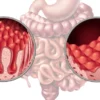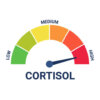
What Causes IBS?
Irritable bowel syndrome (IBS) is a common digestive condition that impacts a significant amount of the global population. The symptoms of IBS include:
- Bloating
- Abdominal pain
- Alterations in bowel patterns (e.g. constipation or diarrhoea)
While the causes of the symptoms seen in IBS may differ from individual to individual, common causes include:
- Medications
- Stress
- Food intolerances
- Imbalances in the gut microbiome
- Gastroenteritis
- Parasites
Following an infection in the gut it’s possible for a low-grade inflammatory response to persist and contribute to the symptoms of IBS.
The duration of the diarrhoea commonly experienced during the infection is a strong indicator of the chance of IBS developing. This may indicate the severity of the inflammatory response. [Source: Pubmed]
Do parasites cause IBS?
Several parasites have been linked to IBS. The way they are understood to contribute to IBS symptoms is via several means that include: altering the gut microbiome, increasing inflammation, disrupting the gut lining and altering the immune response in the gut.
2 common parasites that have been linked to IBS are Blastocystis hominis and Dientamoeba fragilis. In actual fact, these organisms are classed as non-pathogenic parasites and their link to IBS has been found in several studies, however, other studies have found no link.
A 2017 study found that 25% of those with IBS had Blastocystis present in their gut. While this was only detected in 9% of those without IBS. This parasite is highly prevalent in those with acute and chronic diarrhoea.
Also Read: Does IBS Cause Diarrhoea
The study also detected Cryptosporidium in 12% of those with IBS. This parasite was found in none of those in the study who did not have IBS.
It has also been found that these organisms can trigger symptoms of post-infectious IBS. This can be where the organism has been cleared from the gut, but symptoms persist. This can be due to changes in the gut microbiome, low-level inflammation and alterations to the immune system in the gut lining. [Source: Pubmed]
Is Blastocystis hominis bad for the gut?
It is important to note that there are different types (sub-types) of Blastocystis hominis. A meta-analysis study concluded that it was only the 1 and 3 subtypes of Blastocystis hominis that were seen as a risk factor for IBS. [Source: Pubmed].
The fact that 9 types of this organism have been identified can be another factor to take into consideration when examining its role in IBS. [Source: Pubmed]
Does Giardia cause IBS?
Giardia is a parasite that has been reported in those with IBS. A recent study found this parasite in the guts of 8.3% of those with IBS. This aligns with previous studies that have reported the presence of this parasite in between 5-10% of those with IBS. [Source: Pubmed]
As with other infections, most of the infections with the gut parasite Giardia are self-limiting. This means that symptoms resolve without intervention. However, chronic infections are possible as are reinfections.
The duration of the infection increases the risk of developing IBS. The risk of developing IBS after the infection (referred to as post-infectious IBS) is greater when the infection lasted 2-4 months. This is likely due to the presence of inflammation in the small intestine. [Source: Pubmed]

Do parasites cause diarrhoea?
A wide range of gut and IBS symptoms can result from a parasitic infection. These symptoms are what is typically seen in IBS and include abdominal pain, and alterations in bowel patterns (diarrhoea or constipation) as well as abdominal pain.
Blastocyctis hominis infections are most commonly reported in IBS-D (irritable bowel syndrome with diarrhoea). As mentioned previously, this may be more likely due to specific subtypes of this gut parasite.
Studies have also that Blastocystis, as well as Giardia and Cryptosporidium infections, are also commonly seen in those with IBS-C (irritable bowel syndrome with constipation). This leads to the conclusion that parasites may contribute to the onset of IBS with either subtype of bowel movements.
Parasites and stomach pain and aches
Along with bloating and gas, there can be lots of reasons for stomach pain, parasites being one of them.
This can be due to disrupted intestinal activity, increased sensitivity in the nerves in the gut lining, and higher levels of gas being produced.
Parasites may also contribute to a low-level inflammatory response in the gut lining. This can be part of the reason for the increased nerve sensitivity or altered bowel function which then contributes to stomach pain and discomfort seen in IBS.
The parasite Blastocystis hominis is understood to contribute to symptoms such as abdominal pain, diarrhoea, nausea, vomiting, decreased appetite and flatulence. This parasite may be present in between 13%-18% of those with abdominal pain.
It has also been found that by treating this parasite with antimicrobial agents or probiotics, symptoms of IBS improve. [Source: Pubmed]
IBS After Being on Holiday
It’s common for IBS to occur while on holiday. Between 10-40% of people develop diarrhoea while away travelling and is therefore commonly referred to as travellers’ diarrhoea. This can be the result of eating contaminated food or water.
The highest rate of this type of traveller’s diarrhoea is when travelling from a developed country to visiting a developing country. It is also known that children are at the highest risk.
Most cases are due to the ingestion of the bacterial pathogen E Coli and typically occur within the first days of being in a new country.
Typically this is a self-limiting situation. This means that symptoms resolve by themselves. However, in some this may develop into post-infectious IBS. This type of IBS is the result of changes within the gut, caused by an infection. [Source: Pubmed]
It is also possible for a parasitic infection to contribute to the ongoing nature of IBS and gut symptoms. [Source: Pubmed]
Best diet to treat parasites
Throughout most of human history, humans have eaten a diet comprised of meats, fruits and vegetables. It was not until the 20th Century that the human diet started to feature higher amounts of highly processed foods. This low-fibre, highly-processed diet is now commonly referred to as the Western Diet.
This type of diet and been associated with nutrient deficiencies as well as conditions such as Crohn’s disease and increased risk of a parasitic infection.
To address imbalances in the gut and support long-term gut health, there are certain foods that contain immune-supporting nutrients to strengthen the immune response along the gut lining.
This involves overall dietary patterns that include fibre, a wide-variety of plant foods a limited amount of processed foods. [Source: Pubmed]
There are also key nutrients linked to gut health and immune function.
Vitamin A is required to support the immune system along the gut lining, in particular for the production of secretory IgA as well as being central to regulating the inflammatory response.
Vitamin A-rich foods include:
- Liver
- Kidney
- Carrots
- Kale
- Spinach
- Eggs
- Tomatoes
Selenium is a key nutrient that supports the immune response within the gut as well as protects against oxidative stress.
Selenium-rich foods include:
- Pork
- Beef
- Turkey
- Chicken
- Fish
- Shellfish
- Eggs
- Brazil nuts
Lower levels of zinc have been shown to impact the immune function of the human body. It’s also been indicated that lower levels of zinc can lead to inflammation. Low zinc levels may not only contribute to an increased inflammatory response to a parasitic infection but potentially influence the ongoing inflammatory response seen in post-infectious IBS.
Zinc-rich foods include:
- Oysters
- Red meat
- Poultry
- Beans
- Nuts
- Crab
- Lobster [Source: Pubmed]
Papaya seed parasite cleanse
Papaya seeds have been reported online to treat gut parasites. Papaya is also called papaw, pawpaw, mamao and tree melon and is found in a range of tropical counties. The seeds of this fruit contain natural anti-parasitic compounds such as benzyl isothiocyanate and papain.
A study from 2007 examined the use of these seeds to treat gut parasites in children (ages between 2 and 6) which was found to successfully clear a range of parasites that include Giardia and Entamoeba histolytica.
The formula given in this study was a blend of powdered papaya sends and honey, which has also been found to have anti-parasitic properties. The clearance rates with the formula of the parasites assessed were between 71.4% and 100%. [Source: Pubmed] A limitation of this study was the smaller number of people included.
Can probiotics treat parasites?
Several studies have concluded the beneficial effect of probiotics to address parasites in the gut. This benefit of probiotics to address parasites can be the result of factors such as inhibiting parasitic development, supporting the gut immune system and addressing the balance of the beneficial gut microorganisms.
These studies have also reported that the specific strain of the probiotic bacteria used may be crucial when addressing parasites. For example, the probiotics L. johnsonii and E. faecium SF68 may be most effective when addressing Giardia Lamblia. [Source: Pubmed]
The probiotic yeast Saccharomyces boularii has been studied in those with a Blastocystis hominis infection. The results of this 2011 study found this supplement to be effective at treating this parasite. This study also measured the effectiveness of Saccharomyces boulardii against the antibiotic Metronidazole and found they had similar levels of effectiveness (94.4% vs 93.3%) [Source: Pubmed]
Natural approaches to treating parasites
Along with probiotics, herbal supplements can be helpful when looking to support the balance of the gut microbiome. Similar approaches can be used for other gut issues such as SIBO due to the ability of herbs to address bacteria as well as parasites.
The herbs that can be used as a parasite cleanse include:
- Black walnut
- Oregano oil
- Wormwood
- Clove oil
- Grapefruit seed extract [Source: Pubmed, Pubmed, Pubmed, Pubmed]
It is also likely that along with parasitic infections, there may be bacterial and fungal imbalances in the gut microbiome. [Source: Pubmed]
Understanding the balance of the microbiome via testing can help to refine this approach and the herbs and supplements used. Since there are other causes of these symptoms, testing can also mean that there is a clear understanding of the underlying issue.
Conclusion
Gut infections can have a significant impact on digestive health. This can be the result of the pathogen still being present in the gut or due to the post-infectious consequences. In both of these situations understanding the root cause of the gut and IBS symptoms is an important part of the treatment.
Working with a qualified gut health nutritional therapist can guide you through the testing options and treatment process to address these symptoms.






